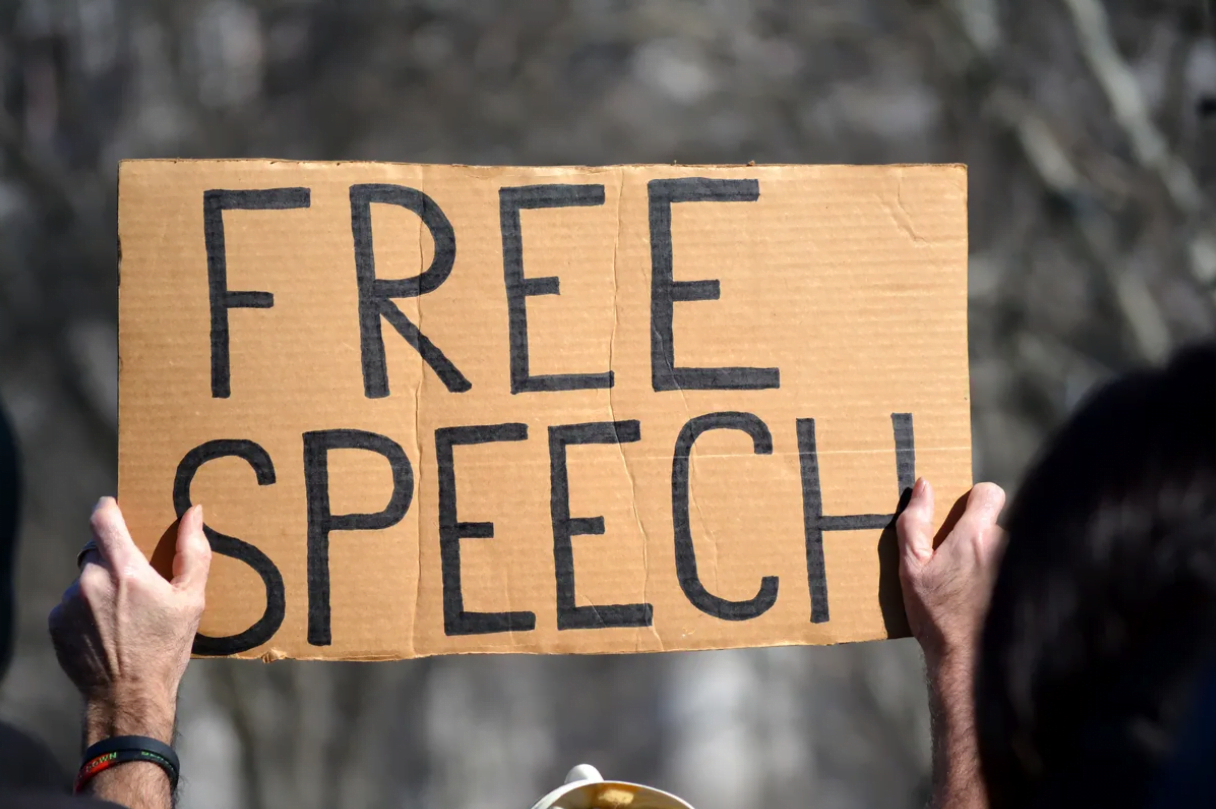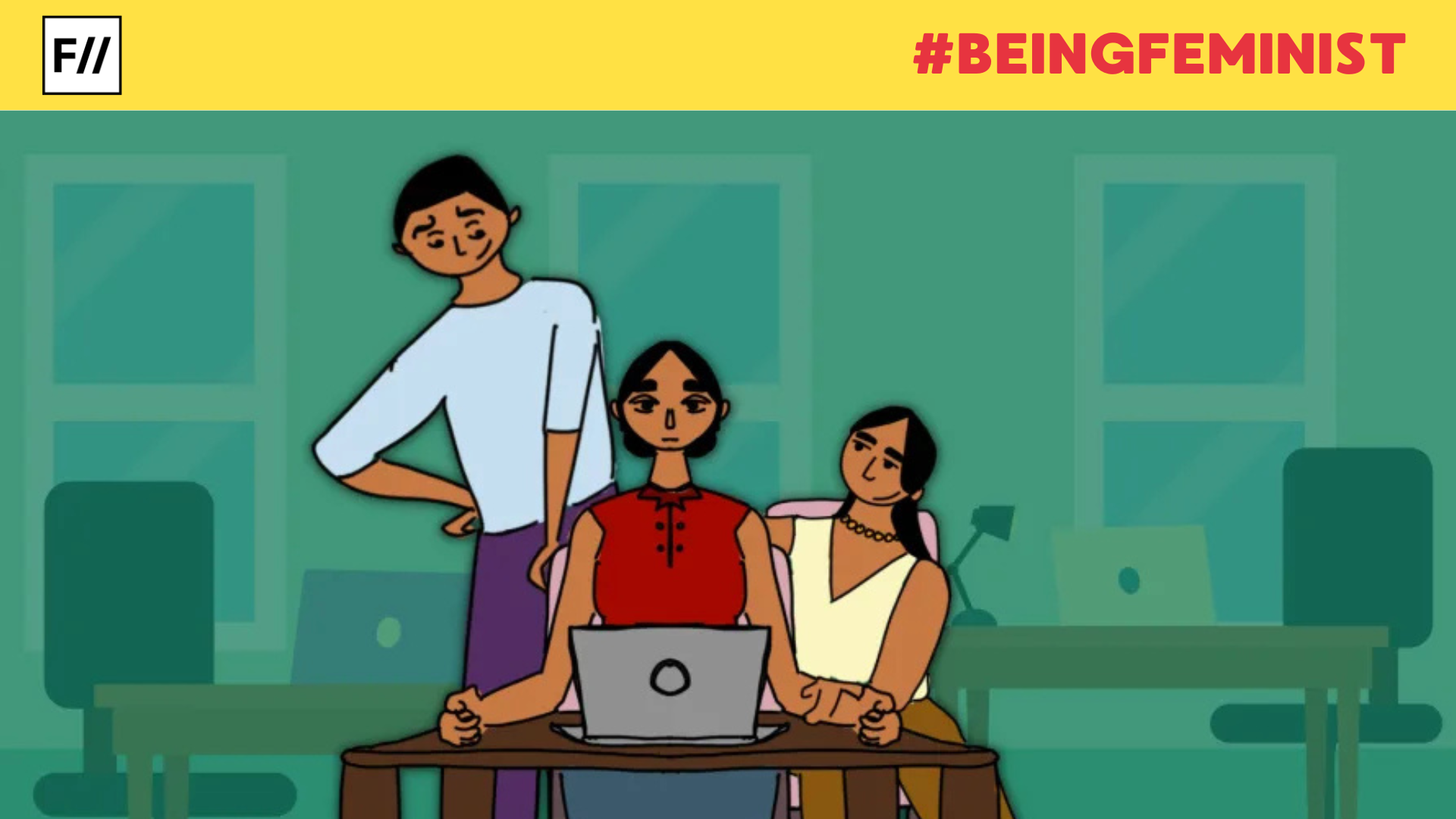As India gears up for its highly contentious and divisive 18th Lok Sabha elections, a cloud of gloom hangs over the nation’s commitment to free speech and expression. The Free Speech Collective’s (FSC) report paints a grim picture, revealing a systematic crackdown on dissenting voices, journalists, academics, social media influencers, and ordinary citizens alike.
With false narratives, deliberate disinformation, and hate speech dominating the electoral agenda, the space for verified information, constructive debate, and the voicing of dissent has all but disappeared.
A chilling climate of fear
The FSC’s review of free speech violations from January to April 2024 is a harrowing testament to the deteriorating state of civil liberties in India. Across the country, a staggering 134 instances of free speech violations have been recorded, ranging from arbitrary arrests and physical attacks to censorship, harassment, and threats.
Journalists have borne the brunt of this crackdown, with at least five arrested since the beginning of the year, and six others languishing in custody for extended periods. The arrests of journalists like Dhanabir Maibam, Santu Pan, and Ashutosh Negi, though granted bail, serve as a stark reminder of the risks they face in pursuing their profession.
Attacks on free speech
The report also highlights the alarming trend of physical attacks and intimidation against journalists and citizens exercising their right to free speech. At least 34 journalists were among the 46 citizens attacked across the country, with incidents ranging from chases by murderous mobs to brutal beatings.
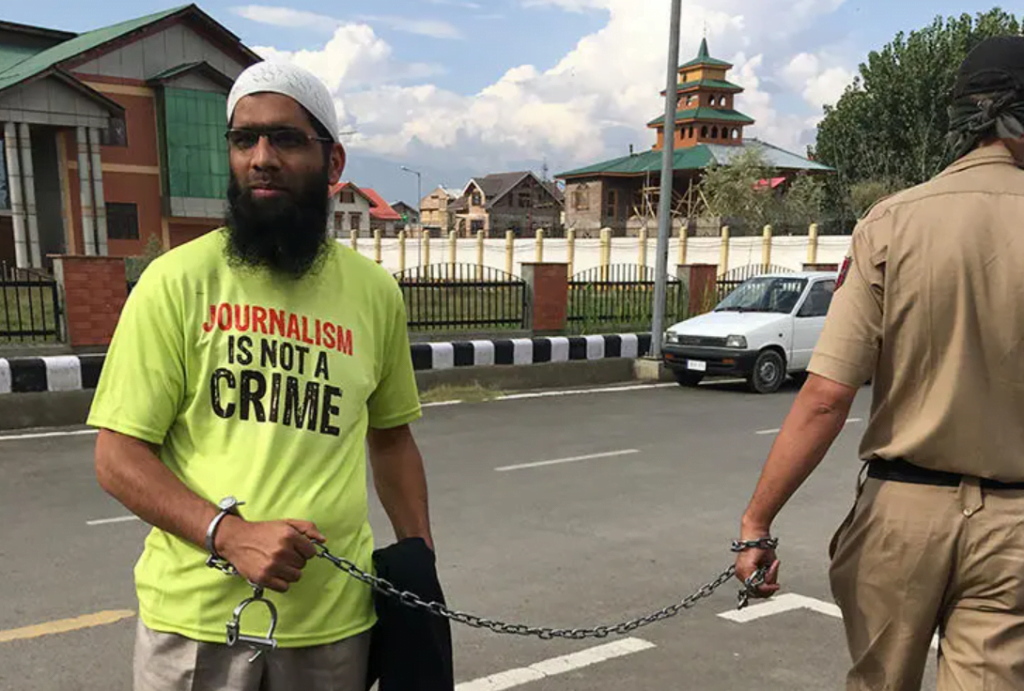
The cases of senior Marathi editor Nikhil Wagle, who was chased by a violent mob in Pune, and photojournalist Sanjay Kanera, who narrowly escaped with his life after being attacked by a mob in Haldwani, Uttarakhand, serve as chilling reminders of the dangers faced by those attempting to hold the powerful accountable.
Censorship: A multi-faceted assault
The report also sheds light on the multifaceted assault on free speech through censorship, spanning social media, news media, academia, and even the realm of entertainment. The blocking of websites like Hindutva Watch and India Hate Lab, which track hate speech, and the orders to take down critical reports by publications like Caravan magazine, exemplify the government’s intolerance for dissenting voices.
The situation in academic spaces is particularly concerning, with 24 instances of censorship recorded in just the first four months of the year. Vigilante groups, both online and offline, have staked out their targets, aided by right-wing media platforms that whip up sentiments against citizens expressing their views.
The silencing of inconvenient voices
Perhaps the most alarming aspect of the report is the targeting of international journalists and academics, seen as inconvenient voices in India’s democratic discourse. The forced departure of Australian Broadcasting Corporation’s South Asia bureau chief, Avani Dias, and the revocation of French journalist Vanessa Dougnac’s Overseas Citizen of India (OCI) card, as well as the deportation of UK-based Kashmiri academic Nitasha Kaul, serve as stark reminders of the government’s growing intolerance for critical voices.
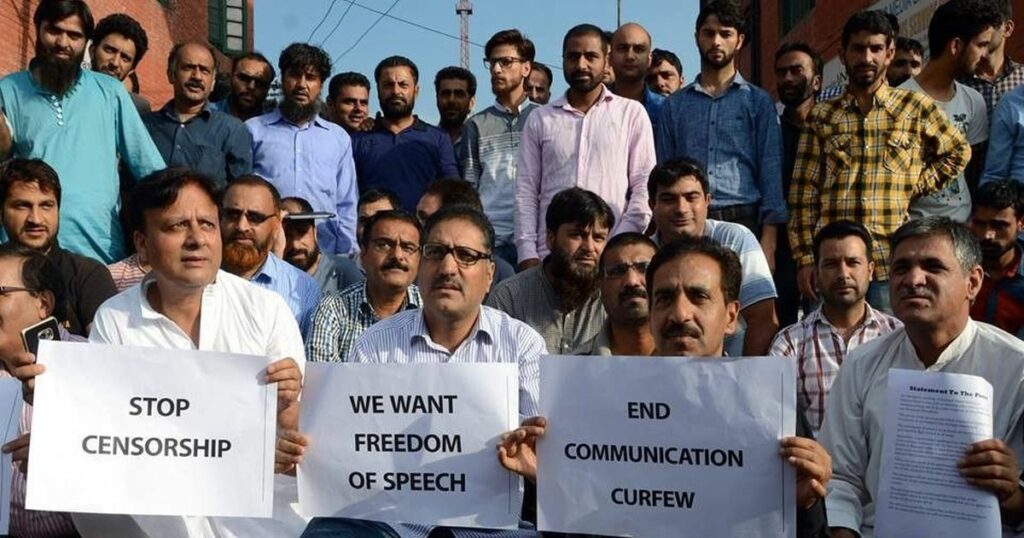
India’s dismal ranking in the World Press Freedom Index, published annually by Reporters Without Borders (RSF), is a stark reflection of the country’s deteriorating state of press freedom. In 2023, India ranked a dismal 159th out of 180 countries, significantly dropping from its 150th position the previous year. This abysmal ranking places India among the worst-performing democracies regarding safeguarding the freedom of the press.
According to RSF, the Indian government’s use of draconian laws like the Unlawful Activities Prevention Act (UAPA) against journalists, as well as the growing instances of online harassment and coordinated hate campaigns against critical voices, have contributed to this alarming decline.
The FSC report corroborates these concerns, detailing numerous instances of journalists facing legal harassment, physical attacks, and censorship for their work. The arrest of Aasif Sultan, a Kashmiri journalist who was re-arrested under the UAPA just days after being granted bail in earlier cases, exemplifies the misuse of such laws to silence dissent.
Media manipulation and partisan narratives
A survey conducted by the News Minute further highlights the extent to which mainstream media has been co-opted to propagate partisan narratives and undermine dissenting voices. The survey found that prime-time news shows have increasingly become platforms for propagandistic rhetoric, attacking opposition leaders and parties on issues such as problems within the INDIA alliance, Delhi Chief Minister Arvind Kejriwal’s arrest in the liquor scam case, and Congress leader Rahul Gandhi’s “Shakti” comments.
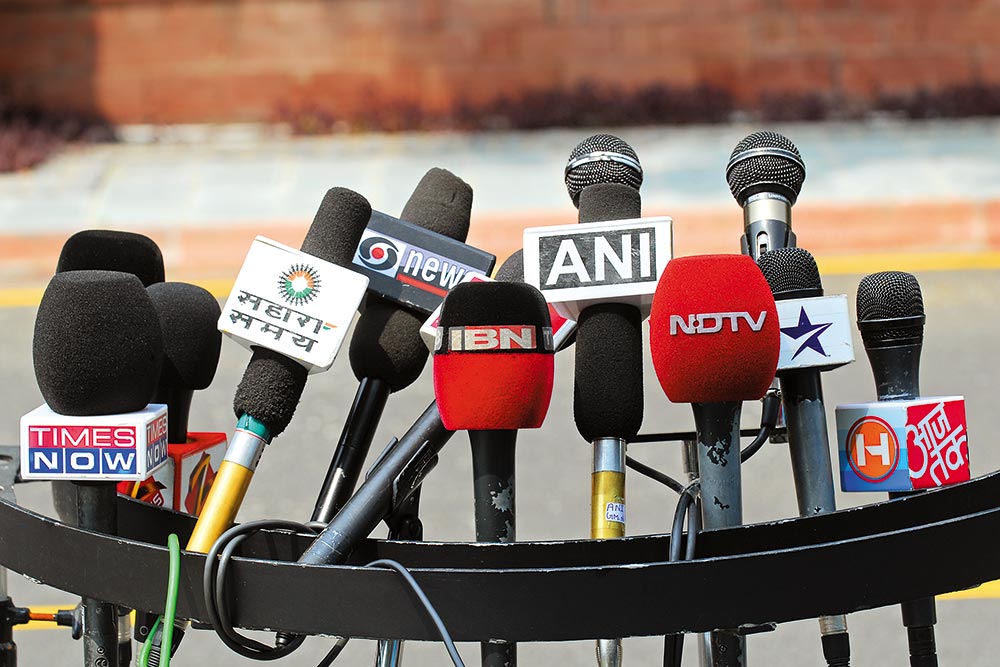
Anchors like Times Now’s Navika Kumar and Republic’s Arnab Goswami have been at the forefront of this assault, using hashtags like #RahulStrangeness, #RahulAttackingShakti, and questioning whether “Rahul Gandhi has lost it?” or asking him to “get a life.” Meanwhile, debates classified as pro-government have seen anchors praising Prime Minister Narendra Modi’s speeches, his global image, and the policies of BJP-governed states.
When Modi inaugurated the BAPS temple in Abu Dhabi, news anchors rushed to portray him as an ambassador for “Sanatan Dharma.” Times Now Navbharat anchor Sushant Sinha claimed, “Har koi kehta hai ki Narendra Modi ne yaha Ayodhya bana diya hai.” Shows where anchors praised the poll strategies of the BJP or its leaders were also counted as pro-government.
The survey also revealed a disturbing trend of communal polarisation and hate speech being propagated through prime-time news. Anchors focused on issues like the Gyanvapi mosque row, celebrating the Hindu side’s legal victory; the opposition’s comments on “Sanatan Dharma,” quoted without context; and Mukhtar Ansari’s death, where they praised UP Chief Minister Yogi Adityanath for acting against a “gangster” and blamed opposition parties for using him for “appeasement.”
This narrative of “Muslim appeasement” has become a recurring theme, with broadcasts accusing the opposition of pandering to minority communities without taking into account the government’s responsibility on key issues such as electoral bonds.
The crackdown on independent voices
The crackdown on independent voices has extended beyond traditional media, with the government issuing notices to shut down popular YouTube channels like National Dastak, known for covering issues of marginalised sections of society. The arrest of fact-checker Mohammad Zubair for his work in exposing hate speech and disinformation further underscores the government’s intolerance of dissenting voices.
NewsClick editor Prabir Purkayastha and his associates were also targeted, and arrested under the draconian UAPA in connection with an alleged foreign funding case, raising concerns about the misuse of laws to silence critical journalism.
Extrapolating the data: A grim forecast
If the trends highlighted in the FSC report continue unchecked, the ramifications for India’s democratic fabric could be severe. Based on the data from the first four months of 2024, extrapolation suggests that by the end of the year, the number of free speech violations could potentially surpass 400, with over 100 journalists facing arrests, attacks, or harassment.
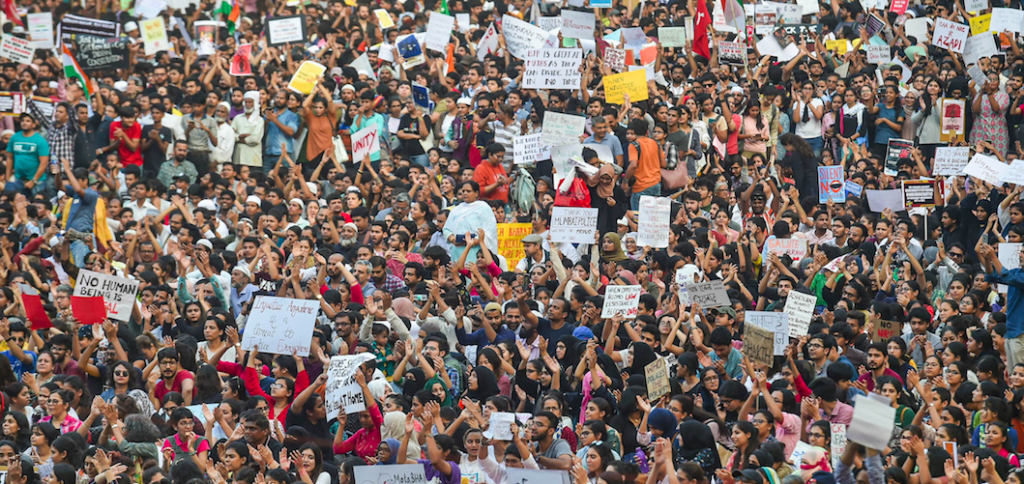
Furthermore, if the government’s crackdown on dissenting voices intensifies during and after the elections, the number of censorship instances across social media, news media, academia, and entertainment could skyrocket, potentially reaching alarming levels not seen in recent history.
The Free Speech Collective’s report, coupled with the findings of the News Minute survey, is a clarion call for action, urging citizens, civil society organisations, and the international community to stand up for the fundamental rights that define India’s democratic fabric. As the nation grapples with the challenges of preserving its democratic ideals, the choices made today will echo through the annals of history, shaping the future of India’s cherished freedoms.
With India’s press freedom ranking plummeting and the data extrapolations painting a grim picture, it is imperative that concerted efforts are made to reverse this alarming trend. Failure to do so could have far-reaching consequences, not only for the upcoming elections but also for the very fabric of India’s democracy.
The systematic suppression of dissenting voices, the propagation of partisan narratives, and the normalisation of hate speech and communal polarisation threaten to undermine the very foundations of a vibrant and inclusive democracy. Independent media, academia, and civil society organisations must be empowered to fulfil their role as watchdogs and catalysts for constructive dialogue.
About the author(s)
Fat, neuro-diverse, and queer are the foremost words Sahil uses to describe themselves. A full-time undergraduate student of Economics at the University of Delhi, Sahil is a Laadli Media awardee of 2023. They are also a recipient of the Reliance Undergraduate Scholar for 2023 and various prestigious fellowships including Global Citizen Year Academy '22 and Civics Unplugged (Civics Innovator Fellowship ’22). Sahil regularly writes for Thred Media, and also for Youth Ki Awaaz as an alumnus of the Justice-Makers WTP ’22.
Sahil is part of UNICEF India's YuWaah Young People's Action Team (YPAT) 2023 and the YLAC Ambassador for Delhi.
